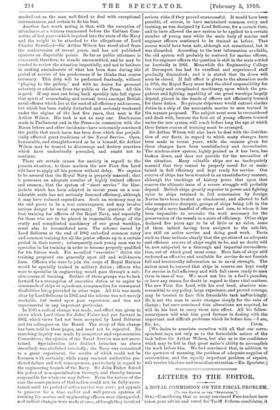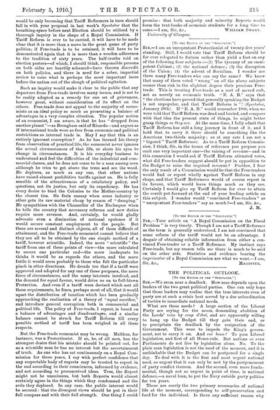LETTERS TO THE EDITOR.
A ROYAL COMMISSION ON THE FISCAL PROBLEM.
iTo THE EDITOR OP THE " SPECTATOR." I
SIn,—Considering that so many convinced Free-traders have taken your advice and Toted for Tariff Beform candidates, it would be only becoming that Tariff Reformers in turn should fall in with your proposal in last week's Spectator that the breathing-space before next Election should be utilised by a thorough inquiry in the shape of a Royal Commission. If Tariff Reform is ever to be carried, it will have to be made clear that it is more than a move in the great game of party politics; if Free-trade is to be retained, it will have to be demonstrated again that it is more than a wooden adherence to the tradition of sixty years. The half-truths told on election posters—of which, I should think, responsible persons on both sides are heartily ashamed—have thrown discredit on both policies, and there is need for a sober, impartial review to raise what is perhaps the most important issue before the nation out of the slough of political agitation.
Such an inquiry would make it clear to the public that any departure from Free-trade involves many issues, and is not to be rashly adopted as a remedy for one set of grievances, however great, without consideration of its effect on the others. Free-trade does not appeal to the majority of econo- mists as an ideal policy so much as presenting a balance of advantages in a very complex situation. The popular notion of an economist, I am aware, is that he has "dropped from another planet "—as Brougham said of Ricardo—and argues as if international trade were as free from economic and political restrictions as internal trade is. May I say that this is an entirely ignorant conception ? As he has learned his theory from observation of practical life, the economist never ignores the actual circumstances of that life, or shuts his eyes to change in circumstances. It is his everyday business to understand and feel the difficulties of the industrial and com- mercial classes, and he does not cease to be a man among men although he tries to get above the trees and see the wood. He deplores, as much as any one, that other nations have raised almost prohibitive tariffs against us. He is fully sensible of the attractiveness of a retaliatory policy, and questions, not its justice, but only its expediency. He has every desire to bind the Colonies to the Mother-country by the closest ties. He feels uneasy when some industry or other gets its raw material cheap by reason of "dumping." He sympathises with the Chancellor of the Exchequer when he tells the country that necessary reforms and new duties require more revenue. And, certainly, he would gladly advocate even a diminution of national opulence if it would secure constant employment to the people. But these are several and distinct objects, all of them difficult of attainment, and the Free-trade economist cannot believe that they are all to be obtained by the one simple method of a tariff, however scientific. Indeed, the more " scientific " the tariff from one of these points of view—the more calculated to secure one particular end—the more ;nadequate he thinks it would be as regards the others, and the more futile it would seem probably to those who felt the particular pinch in other directions. He dreads too that if a tariff were approved and adopted for any one of these purposes, the mere force of circumstances, and the many interests involved, and the demand for equal favour, would drive us on to full-blown Protection. And even if a tariff were devised which met all these requirements, he fears, perhaps most of all, that it would upset the distribution of taxation which has been gra dually approaching the realisation of a theory of "equal sacrifice," and introduce general corruption both in commercial and political life. The policy of Free-trade, I repeat, is based on a balance of advantages and disadvantages, and a similar -balance cannot be struck for Tariff Reform till every possible method of tariff has been weighed in all these respects.
But the Free-trade economist may be wrong. Malthus, for instance, was a Protectionist. If so, he, of all men, has the strongest desire that his mistake should be pointed out, for as a scientific man he has no interest but the ascertainment of truth. As one who has sat continuously on a Royal Com- mission for three years, I say with perfect confidence that any respectable body of experts may be trusted to report in the end according to their consciences, informed by evidence, and not according to preconceived ideas. True, the Report might not be unanimous, but both Reports would almost certainly agree in the things which they condemned and the evils they deplored. In any case, the public interest would be secured : that the divergent views should be put in their full compass and with their full strength. One thing I could promise : that both majority and minority Reports would form the text-books of economic students for a long time to











































 Previous page
Previous page